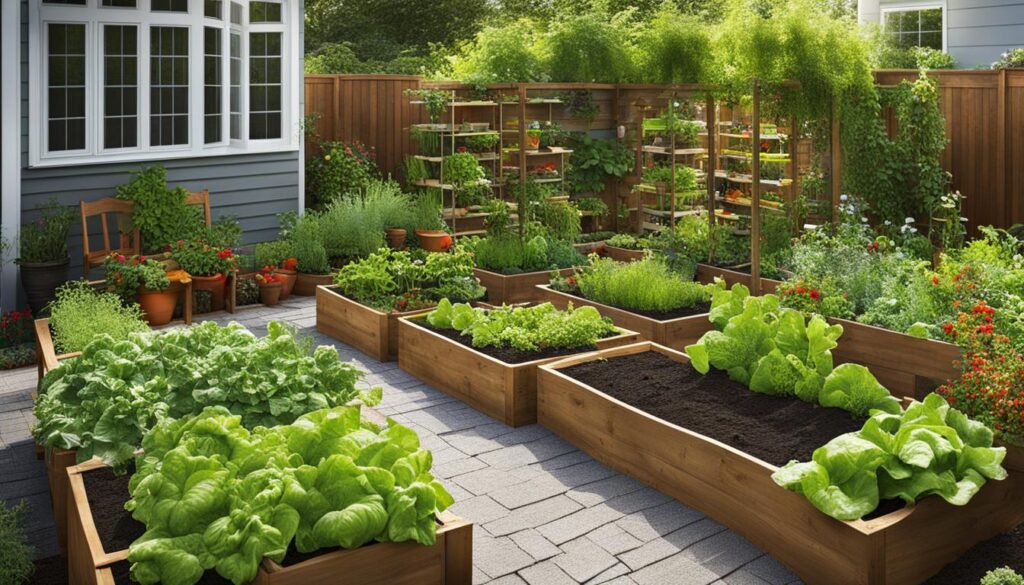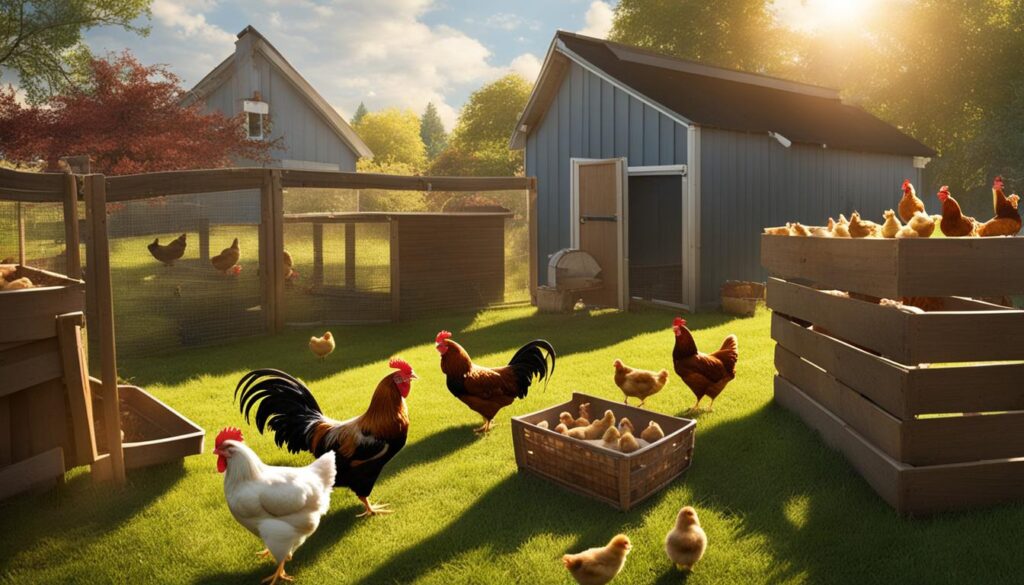
Are you ready to take control of your food production and become more self-sufficient? Look no further than raising chickens right in your own backyard. Whether you’re a survivalist looking to ensure your food security or simply interested in sustainable food production, raising chickens can provide you with a reliable source of both food and companionship.
Backyard chicken farming has gained popularity in recent years, as more people recognize the benefits of chicken rearing for sustenance. By raising your own chickens, you can reduce your reliance on supermarkets and external food supply chains. Plus, the process of tending to your survivalist chickens offers a fulfilling and educational experience.
With the right knowledge and approach, you can achieve self-sufficiency through chicken farming. This survivalist’s poultry guide will provide you with essential information on raising chickens for survival. From selecting the best breeds for food and egg production to ensuring proper care and sustainable food production practices, this guide will empower you to become more self-reliant and take control of your own homesteading with chickens.
Key Takeaways:
- Raising chickens in your backyard can provide a sustainable source of food, including eggs and meat.
- Many cities and towns allow families to keep a certain number of laying hens, even in urban areas.
- Best breeds for egg production include Leghorns, Orloffs, and Anconas.
- For meat production, consider Cornish Cross hybrids or Bresse chickens.
- Raising chickens offers benefits such as food security, cost savings, pest control, fertilizer, and personal satisfaction.
Best Breeds for Egg Production
When it comes to egg production, certain chicken breeds stand out for their exceptional productivity and ability to provide a consistent supply of fresh eggs. Whether you are a survivalist looking to ensure a sustainable food source or simply want to enjoy the benefits of having homegrown eggs, these breeds are known for their prolific egg-laying capabilities.
Leghorn
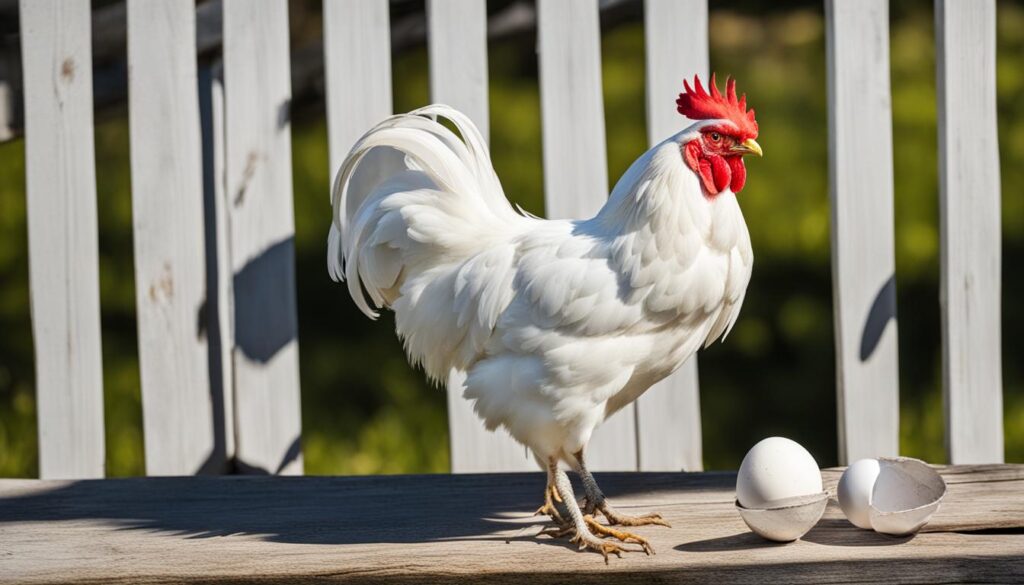
The Leghorn breed, originally from Italy, is renowned for its lightweight frame and exceptional egg production. Leghorn hens are prolific layers, averaging around 280 eggs per year. With their efficient feed-to-egg conversion, Leghorns are efficient contributors to sustainable egg production, making them a popular choice among backyard chicken keepers.
Orloff
For survivalists or those residing in colder climates, the Orloff breed offers an ideal combination of hardiness and egg-laying capabilities. These chickens are known for their excellent cold resistance and can continue laying eggs even in harsh winter conditions. While their egg production may not match that of Leghorns, Orloffs are a reliable choice for sustainable egg production in colder regions.
Ancona
Anconas are hardy and compact chickens that can adapt to various climates and lay a respectable number of eggs each year. Known for their adaptability and resilience, Anconas can withstand extreme temperatures, making them an excellent choice for sustainable egg production. These birds typically lay around 250-300 eggs per year, making them a valuable addition to any backyard flock.
By choosing breeds like Leghorn, Orloff, and Ancona, you can ensure a sustainable source of eggs for your self-sufficiency goals. These egg-laying hens offer consistent and plentiful egg production, helping you achieve a more sustainable and resilient approach to food production.
Best Breeds for Meat Production
If you’re primarily interested in raising chickens for meat, there are specific breeds that excel in meat production. The Cornish Cross and related hybrids are popular choices for broiler chickens, reaching a slaughter weight of 6 pounds in as little as 5-8 weeks. Bresse chickens, although initially harder to find, are prized for the tenderness and richness of their meat. For those seeking dual-purpose breeds that provide both meat and eggs, the Orpington, Rhode Island Red, and Plymouth Rock are reliable options.
| Chicken Breed | Meat Production | Egg Production |
|---|---|---|
| Cornish Cross | Excellent | Not Ideal |
| Bresse | Exceptional | Not Ideal |
| Orpington | Good | Good |
| Rhode Island Red | Good | Good |
| Plymouth Rock | Good | Good |
Disclaimer: Please note that the table above provides a general overview and individual results may vary based on various factors such as breeding, feeding, and management practices. It’s essential to research and consult with experienced breeders or poultry experts to determine the best breed for your specific needs and circumstances.
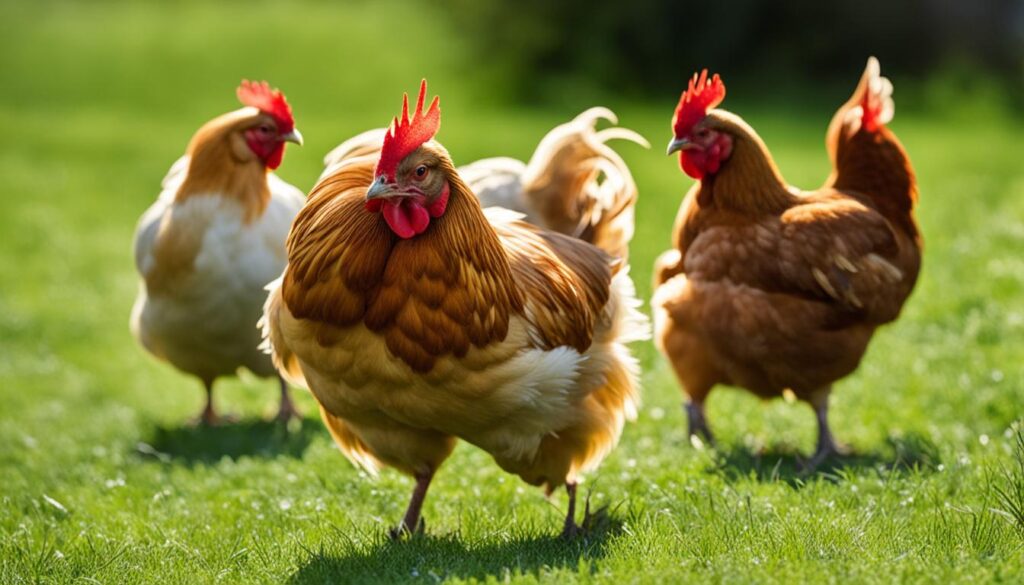
Why Choose Cornish Cross?
Cornish Cross is widely recognized as one of the best breeds for meat production. These chickens have been bred specifically for their rapid growth and meaty carcasses. In just a matter of weeks, Cornish Cross chickens reach a substantial slaughter weight, making them an efficient choice for meat production. Their meat is moist and flavorful, making it a favorite among meat lovers.
Bresse Chickens: A Culinary Delight
Bresse chickens, originating from France, are renowned for their exquisite flavor and delicate texture. Although they might be harder to find compared to other breeds, their meat is well worth the search. Raised traditionally and allowed to roam freely, Bresse chickens develop tender muscles and a unique flavor profile that sets them apart. Considered a true gastronomic delight, Bresse chicken is highly sought after by professional chefs and food enthusiasts alike.
Benefits of Raising Chickens for Food and Eggs
Raising chickens for food and eggs provides a multitude of benefits that contribute to a sustainable and rewarding lifestyle. Let’s explore the advantages that come with embracing backyard chicken farming:
- Food Security: By raising chickens, you can ensure a consistent supply of fresh eggs and meat, reducing your dependence on external food sources. This enhances food security, especially during uncertain times.
- Cost Savings: Raising chickens is a cost-effective alternative to purchasing eggs and meat from the grocery store. By producing your own food, you’ll save money in the long run and have access to high-quality, organic options.
- Pest Control: Chickens can serve as effective pest controllers in your garden. They naturally forage for insects and other pests, reducing the need for chemical pesticides and promoting a healthier environment for your plants.
- Fertilizer: Chicken manure is a valuable natural fertilizer. It is rich in nutrients and can significantly improve soil fertility, leading to healthier plant growth and higher yields in your garden.
- Educational: Raising chickens offers an excellent educational opportunity, especially for children. It teaches them valuable lessons about responsibility, self-sufficiency, and the origins of food. Children can develop a deeper appreciation for nature and become more conscious consumers.
- Personal Satisfaction: Many people experience personal satisfaction and fulfillment from raising chickens. The daily care, interaction, and bond with these feathered friends bring joy and a sense of purpose. Observing their growth and development can be incredibly rewarding.
Overall, raising chickens for food and eggs is a practical and fulfilling endeavor. It not only provides numerous benefits such as food security, cost savings, pest control, and natural fertilizer but also offers educational opportunities and personal satisfaction. Embrace the journey of self-sufficiency and enjoy the company of these remarkable creatures.
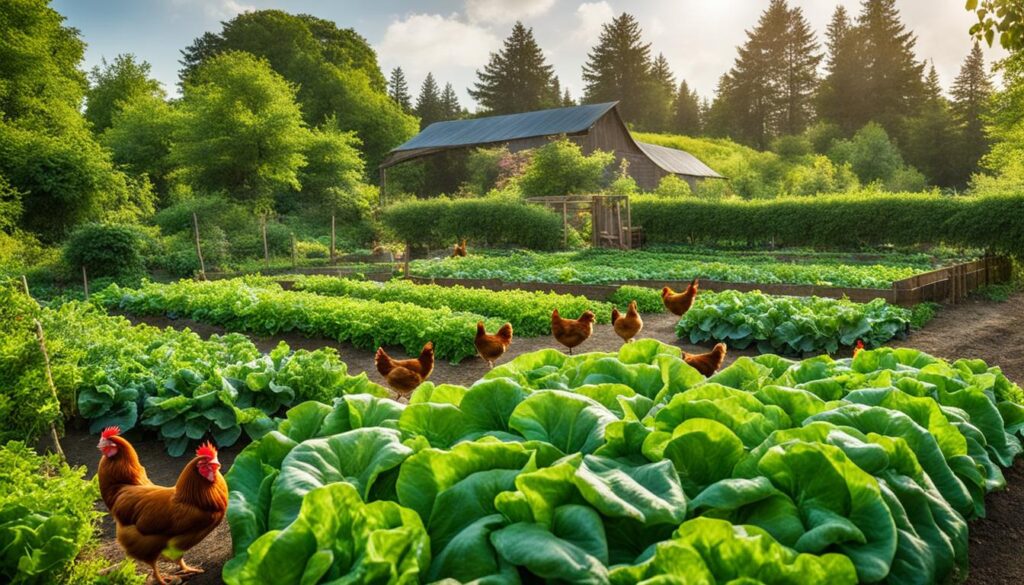
Conclusion
Raising chickens for food and eggs is a practical and rewarding endeavor for those seeking self-sufficiency and sustainable food production. Whether you have a small backyard or a larger piece of land, chickens can provide a valuable source of fresh eggs and meat. By choosing the right breeds and providing proper care, you can create your own backyard flock that contributes to your food security. Not only does raising chickens offer financial savings and environmental benefits, but it also brings a sense of fulfillment and satisfaction.
Backyard farming with chickens allows you to have control over the quality and source of your food, reducing reliance on commercial suppliers and ensuring a more sustainable future. With the Survivalist’s Guide to Raising Chickens for Food and Eggs, you can learn the essential skills and knowledge needed to embark on this self-sufficient journey. Discover the joys of backyard farming, as you experience the satisfaction of producing your own food in a sustainable and responsible manner.
Start your backyard farming journey today and unlock the keys to self-sufficiency. Embrace the benefits of sustainable food production, connect with nature, and enjoy the rewards of raising chickens for food and eggs. With dedication and passion, you can become a backyard farmer and make a positive impact on your health, your environment, and your community.
FAQ
What breeds are best for egg production?
The best breeds for egg production include Leghorns, Orloffs, and Anconas. These breeds are known for their high productivity and can provide a sustainable source of fresh eggs.
What breeds are best for meat production?
For meat production, consider breeds like the Cornish Cross hybrids and Bresse chickens. The Cornish Cross grows rapidly and reaches a slaughter weight of 6 pounds in as little as 5-8 weeks, while Bresse chickens are prized for their tender and rich meat.
What are the benefits of raising chickens for food and eggs?
Raising chickens for food and eggs offers several benefits, including food security by reducing reliance on external supply chains. It also leads to cost savings, helps control pests in your garden, provides natural fertilizer through chicken manure, and can be an educational and fulfilling experience for the whole family.
Can I raise chickens in an urban area?
Many cities and towns allow families to keep a certain number of laying hens, even in urban areas. It’s important to check your local regulations and ordinances regarding backyard chicken farming.
How do I start raising chickens for food and eggs?
To start raising chickens for food and eggs, you’ll need to choose the right breeds, provide proper care and nutrition, and create a suitable living space for your chickens. It’s also important to gather knowledge and resources to ensure the health and well-being of your flock.
Can I raise chickens if I have limited space?
Yes, you can raise chickens even if you have limited space. There are space-efficient coop designs available, and some breeds, like Bantams, are smaller in size and require less space. However, it’s important to ensure that your chickens have adequate space to move around and access to fresh air and sunlight.


